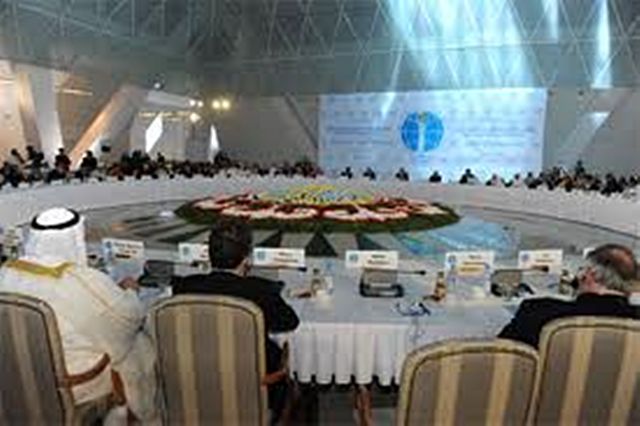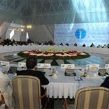
Kazakhstan Views Its Inter-Faith Dialogue Initiative As Key To Global Security
Publication: Eurasia Daily Monitor Volume: 9 Issue: 95
By:

On May 30-31, Kazakhstan will host the 4th Congress of Leaders of World and Traditional Religions – for the fourth time since it initiated the practice in 2003 – to discuss the role of religion and inter-faith dialogue in promoting global security and human development. The forum is not expected to save the world, but it will elevate Astana’s emerging role in global affairs and emphasize the need for inter-faith dialogue in addressing pressing international issues.
As a country with a largely Muslim yet multi-ethnic population and a secular government keen on leading inter-faith dialogue initiatives, Kazakhstan believes it can contribute to global security. It held the 1st Congress in 2003 on the role of inter-faith dialogue in preventing conflicts, two years after the 9/11 attacks heightened tensions between Muslims and Christians worldwide and put the fight against terrorism at the forefront of the US agenda. Later in 2006 it hosted the 2nd Congress on “Religion, Society and International Security” amid raging sectarian violence in Iraq. And in 2009, a year after the worst financial crisis since the Great Depression hit the global economy Kazakhstan organized the 3rd Congress on joint responses to common challenges under themes like “Solidarity, especially during Crisis.” It will host the 4th Congress, titled “Peace and Harmony as the Choice of Mankind,” to focus on issues of development, multiculturalism, youth and women (www.ia-centr.ru, May 4; www.religions-congress.org; www.kazakhembus.com; www.kazakhstanun.org, February 12; www.osce.org, July 9, 2009).
The 4th Congress will underline related challenges in Kazakhstan, forcing it to perform domestically and regionally as it promotes its initiatives internationally. That Astana hosts the Congress places obligations on the government to ensure a tolerant co-existence of ethnic groups and a favorable environment for religious associations in the country and the region facing growing nationalisms and authoritarian practices. With time, Kazakhstan’s related efforts and experience could have a positive effect on its less open neighbors like Uzbekistan and Turkmenistan.
Kazakhstan seeks to position the Congress, which at this stage of its development lacks the capability to enforce major practical decisions, as a platform for understanding and shaping common responses to development, political and security issues affected by religion in regions and nations worldwide (www.religions-congress.org). Apart from general points of tension between civilizations with different religions and cultures – exemplified notably today by tensions between the Muslim world and the West – other controversial issues, religion-related trends, and security challenges across regions justify inter-faith collaboration initiatives to cope with them.
Central Asia, the Caucasus and Russia, for instance, face growing Islamic currents that shape the development of societies and local regimes. These countries and regions also confront the activities of terrorist groups that misuse religion to advance their extremist cause. Tajikistan again sees growing domestic tensions between Islamist and secular forces, which already culminated in a civil war in the 1990s. Kazakhstan, for example, has recently witnessed terrorist attacks by Jund al-Khilafa, which shook the perception of stability in the country. Meanwhile, Russia fights a militant insurgency in the North Caucasus that threatens the country’s territorial integrity. And the war-torn Afghanistan may yet see the comeback of the Taliban whose members continue shaping political and security dynamics in Afghanistan and Pakistan amid plans by the US to withdraw its troops from the region by 2014 (EDM, February 8 and 24, May 7).
South and North-East Asia, in turn, sees religion shaping ties among competing states and civilizations of China, India and Japan, as well as affecting the evolution of strained relations between the largely Hindu India and predominantly Muslim Pakistan – both nuclear-armed states facing the unresolved status of the disputed Kashmir (www.pakobserver.net, May 12). Religion is even viewed as a factor of security in a nuclear-armed, communist North Korea that denies religious freedoms to its citizens in the name of personality cults and communist utopia.
Besides Asia, other regions close to and far beyond the borders of Kazakhstan find themselves facing security challenges and looking for inter-faith dialogue initiatives that could help address them.
This is especially so in the Middle East and North Africa. There, religion defines the politics of the post-war reconstruction of Iraq, besieged by sectarian violence. Religion also affects the emergence of Turkey and the transitions of Egypt and Libya, which are facing tensions between military and Islamic forces. It figures in the rivalry involving Saudi Arabia, Turkey, Egypt and Iran, whose supreme leader allegedly issued a fatwa banning nuclear weapons (www.haaretz.com, May 7). It is also hijacked by al-Qaeda, al-Qaeda in the Islamic Maghreb (AQIM), al-Shabab and the Nigerian militant group Boko Haram which advance an extremist agenda in Yemen, Kenya and Nigeria, among other countries (EDM, May 4, April 6, February 23). Religion is also linked to issues of extremist propaganda and the radicalization of an unemployed and disenfranchised “youth bulge,” as well as to the question of the Arab Spring and its impact on secular and religious groups yearning for both freedom and power in the regions.
Europe and the Americas, with their largely Christian countries and secular governments, too face their own challenges. Religion in Europe is at loggerheads with secularism, sparking debates on immigration, assimilation and multiculturalism. Influential current and former leaders in Germany, France, Britain, Australia and Spain have stated that efforts at building a multi-cultural society failed (AFP, February 10, 2011; www.dw.de, October 17, 2010). Meanwhile, some European countries have adopted laws to ban wearing religious symbols (burqa, naqib, hijab, crosses, etc.) in public spaces or considered doing so, raising tensions between immigrants and native residents (www.newsinfo.inquirer.net, May 11). In the US, where religion defines relations between the growing number of Catholic immigrants and Protestant and Muslim communities (www.religions.pewforum.org), religious tensions should not be ruled out. Importantly, the wars in Afghanistan and Iraq have affected perceptions of Islam in the US, as well as the perceptions of the US and its policies in the Muslim world. Quran burnings by Florida Pastor Terry Jones, which last year prompted violent protests in Afghanistan, illustrate yet another dimension of religious tensions affecting relations between states and peoples alike.
Kazakhstan may seem to be too distant to these conflicts and issues, despite the zeal of its government to advance its inter-faith initiative as an emerging religious and, perhaps with time, a policy-making forum. Ironically, it is the geography of Kazakhstan, located in heart of Eurasia with its rich religious and cultural heritage, and the country’s landlocked status that partially explain and also help Astana promote international cooperation projects, elevate pressing challenges to the global agenda, and advance itself as a key actor in global affairs along the way. The government has thus consistently, even if ambitiously, utilized the Congress of Leaders of World and Traditional Religions as part of its policy to encourage inter-faith dialogue in addressing common challenges. And though the 4th Congress is not projected to resolve conflicts or major grievances any time soon, if at all, Astana wants to state strongly that it must make the first step.





